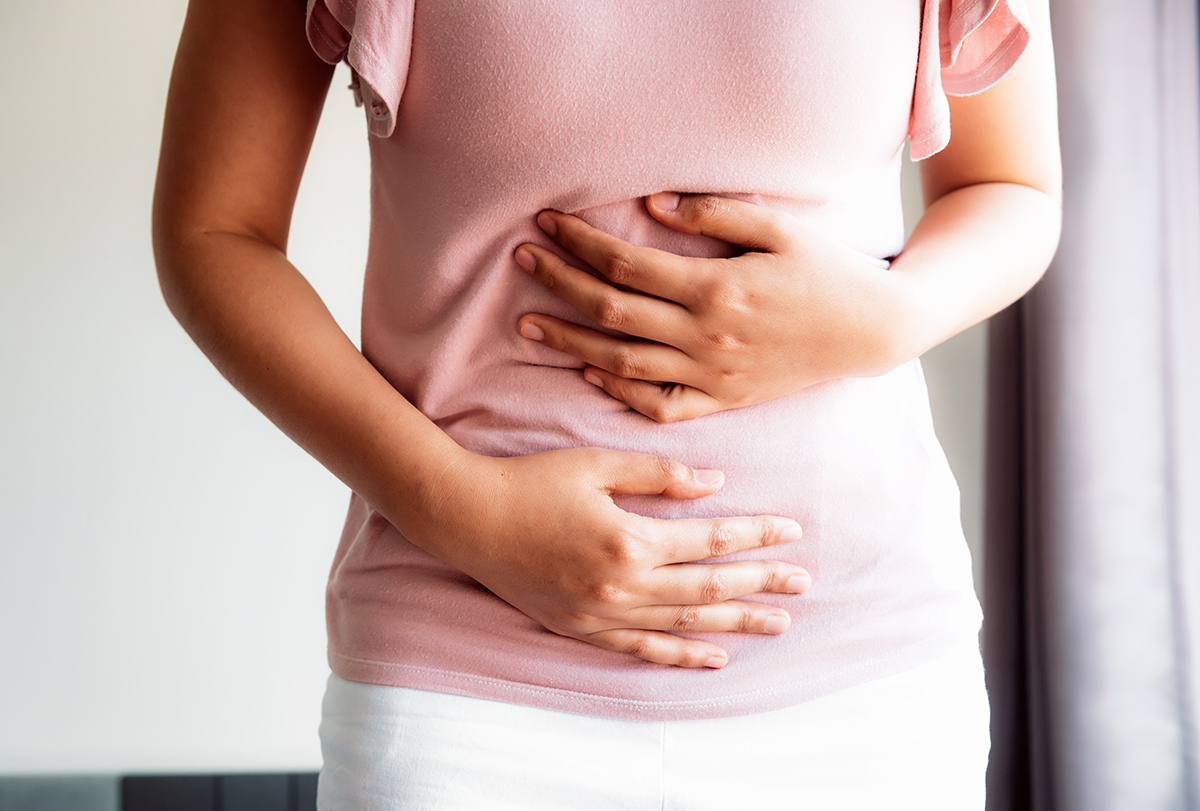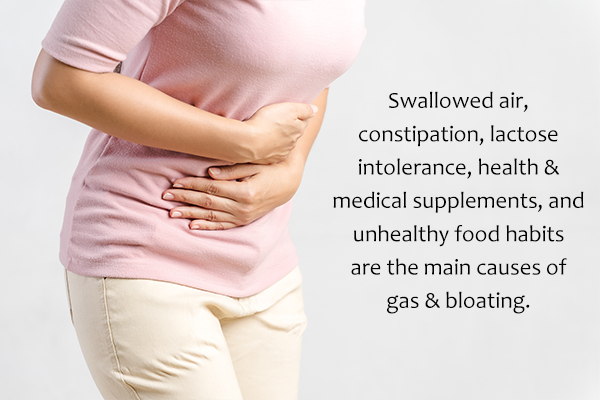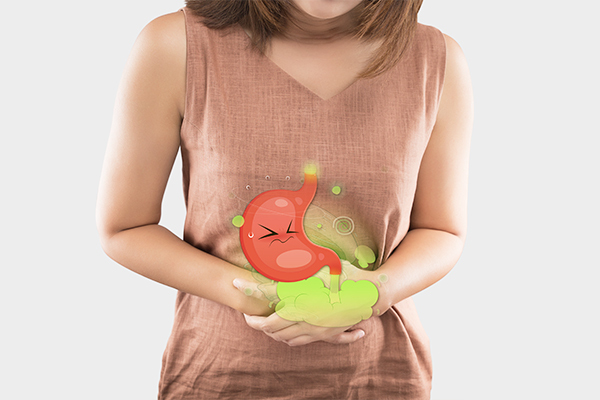In this article:
Gas production in the gastrointestinal tract is a normal part of the digestive process. It is the combined result of swallowing air through the mouth while talking, eating, or even breathing and the bacterial breakdown of ingested food in the large intestine.

Both these factors contribute to the formation of gas in the digestive system, which is then passed out of the body through burping and farting.
The failure to release excess wind through the mouth or anus usually amounts to a buildup of gas inside your digestive system, which can trigger abdominal pain, distress, and distention.
Causes of Gas and Bloating
There is no such thing as a gas-free existence. The discomfort caused by occasional flatulence should not be a cause for concern.
However, excessive or abnormally frequent bloating and flatulence can often be traced back to some underlying causes. If you are prone to such digestive discomforts, the following factors might be responsible.

1. Swallowed air
Some amount of air is swallowed throughout the day, which is eventually expelled through belching, burping, or farting. That said, the passing down of significant amounts of ingested air to the digestive tract will contribute to increased flatulence.
Eating in a hurry is a common mistake that leads to the ingestion of large amounts of air, leaving your stomach uncomfortably bloated.
2. Constipation
People with constipation have to grapple with constant digestive distress due to infrequent and problematic bowel movement.
The inability to relieve your bowels may exacerbate abdominal distension and make you feel heavy. Constipation makes it difficult to pass gas but does not necessarily increase gas production.
3. Lactose intolerance
People with lactose intolerance have a problematic digestive mechanism wherein the stomach, and small intestine fails to process lactose or milk sugar. The undigested lactose is passed directly into the large intestine, where it undergoes some form of bacterial decomposition leading to gas production.
4. Health and medical supplements
Flatulence can be an undesirable side effect of nutritional supplements and some prescribed or over-the-counter medications.
The mode of action of these drugs may influence the natural digestive processes of the body to some extent. Generally, people under fixed dosages of medicines are more susceptible to constipation and gas problems.
5. Food habits
Unhealthy eating patterns and food choices are two of the most common factors responsible for increased bloating and gas.
- Mindless binging on carb-laden junk foods or eating more than your appetite can put undue strain on your digestive system, which can trigger excess gas formation.
- Certain foods and beverages such as fibrous items, dry fruits, and carbonated drinks also contribute to this problem.
- Not chewing your food enough can make it difficult for your stomach to break down the food later.
- Erratic eating and overeating can also make you prone to excess intestinal gas. (1)
At times, unprecedented bouts of bloating and flatulence can be a warning bell for major illnesses that have not been diagnosed yet. If your problem intensifies over time, seek medical help to get checked for:
- Ovarian cancer
- Peptic ulcers
- Celiac disease
- Pancreatic insufficiency, wherein the pancreas fail to produce enough digestive enzymes
- Ascites
- Tumors
- Crohn’s disease
- Inflammatory bowel disease (IBD)
- Bowel obstruction
Symptoms of Gas and Bloating

As the food is gradually broken down at different stages of digestion, gas is released as a by-product. This gaseous load then makes its way through the gastrointestinal tract to find an outlet for its release.
When the air travels upward, it is let out as a burp. A fart occurs when the air travels downward through the intestines and colon and is eventually passed out of the anus.
It is normal for a healthy individual to relieve gas at least 14–18 times a day, (2) or else it will accumulate inside the digestive tract and cause abdominal bloating, among other distressing symptoms. Thus, flatulence is a necessary inconvenience that you must bear for the sake of overall digestive comfort and health.
The following symptoms are indicative of increased buildup of gas inside the digestive tract and abdominal bloating:
- Tightness in and across the abdomen or abdominal distension
- A feeling of fullness whether you have eaten or not
- Aggravated belching and flatulence
- Foul breath
- Constipation
- Diarrhea
- Pain or rumblings in the stomach
- Labored breathing
- Pain that radiates from the stomach to the lower back
Diagnosing Gas, Gas Pain, and Bloating
Excess stomach gas and bloating can be the result of various factors, and diagnosing the root cause of this digestive problem generally involves the following steps:
1. History taking
The doctor will first inquire about your eating habits, symptoms, and medical history to get a background on your condition.
2. Physical examination
The doctor will perform a basic physical examination, which involves feeling the abdomen for any tenderness, ingrowths, and other abnormalities. The doctor may use a stethoscope to listen to abdominal or bowel sounds, which can provide insights into the internal working of the digestive tract.
3. Additional tests
If these preliminary steps prove inconclusive, a few more tests will be performed to determine the root cause of your gassy troubles. These tests include:
- Breath test
- Colonoscopy: To rule out the risk of colon cancer, especially if you are above the age of 50 or have a family history of colorectal cancer
- Imaging tests: To get an inside view of the upper gastrointestinal tract, which includes the small intestine, stomach, and esophagus
How Much Gas Does the Body Produce?
It is estimated that digestive processes produce somewhere around a pint to half a gallon of digestive gas per day, but this amount can vary from person to person and can fluctuate depending on certain physiological and external factors.
Why Do Farts Smell so Bad?

Digestive gases comprise oxygen, carbon dioxide, and nitrogen. This mixture is originally odorless but acquires an unpleasant smell when the digested food passes into the colon for the final stage of the digestive process, wherein the digested food starts decomposing in the large intestine.
The bacterial decomposition infuses trace amounts of hydrogen sulfide, skittle, and indole to the digestive air, giving it a contemptible odor. The foul smell associated with farts is due to the presence of sulfur. The higher the sulfur content, the stronger the smell.
Who Is at Risk?
Bloating, belching, and flatulence are very common in everyday problems. Everyone faces some amount of stomach-related distress time and again. However, for others, this bloating and heaviness can stick around long enough to become irksome.
Complications of Gas and Bloating
Gas production is a normal by-product of digestion, which at times gives you excessive flatulence and a mild bloat.
Seldom is it symptomatic of undiagnosed disease and is nothing to worry about as long as the bloating subsides in a short while. However, if the bloating discomfort becomes too much to handle and you feel that it is related to any serious gastrointestinal issue, consult your doctor.
When to See a Doctor
You may need medical assistance if bloating and flatulence persist for days or weeks, despite proper dietary and lifestyle modifications.
If your stomach feels unusually heavy, full, and tight for a prolonged period and the problem fails to subside even after adopting a healthy lifestyle and good food habits, it can be a warning bell for some major health disorders, such as:
- Kidney ailments
- Liver disease
- Inflammatory bowel disease
- Heart failure
- Some type of cancers
Moreover, you should visit your doctor if the gassy issues are accompanied by other serious symptoms such as:
- Fluctuating appetite, feeling more or less hungry than usual
- Diarrhea
- Vomiting
- Excreting blood with stools
- Unexplained weight loss
- Abdominal cramps
- Anemia
- Fever
- Stools that are dark red or maroon in color
Final Word
A disturbed digestive system can render your entire body extremely uneasy and affect your day-to-day activities, but this problem can be easily relieved through some simple home remedies coupled with a healthy lifestyle and dietary changes.
If you are grappling with recurrent or prolonged episodes of increased gas and bloating, the problem may be systemic or may stem from an underlying issue. In such cases, medical assistance becomes indispensable. The doctor will evaluate your condition and then recommend the appropriate treatment.

- Was this article helpful?
- YES, THANKS!NOT REALLY


